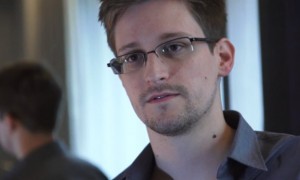After vowing to run a transparent government, President Obama oversaw an unprecedented legal assault on whistleblowers, only now offering up a modest concession, as Linda Lewis explains.
By Linda Lewis
A finding by an Obama administration panel – reached last May but only now becoming public – that the National Security Agency’s inspector general improperly retaliated against a whistleblower may be an attempt to gussy up President Obama’s otherwise ugly legacy for punishing government officials who protest wrongdoing.

Seal of the National Security Agency
The private watchdog group, Project on Government Oversight (POGO), reports that a three-person panel — authorized by Obama’s Presidential Policy Directive 19 and consisting of inspectors general from the CIA, Treasury and Justice — concluded last May that the NSA’s inspector general retaliated against a whistleblower whose identity has not been released.
Based on the panel’s finding, NSA Director Michael Rogers sent NSA Inspector General George Ellard a termination notice. Ellard is now on administrative leave while he appeals the decision.
This newly disclosed finding also is relevant to the high-profile case of NSA whistleblower Edward Snowden, who decided in 2013 that the only way to alert the public to the NSA’s warrantless bulk collection of electronic data on Americans was to take his information to the news media. After Snowden fled the United States and ended up stranded in Russia, Ellard disputed Snowden’s claim that internal protests would not have worked. Ellard said in 2014, “Snowden could have come to me. We have surprising success in resolving the complaints that are brought to us.”
Now, Ellard faces termination over his alleged retaliation against a whistleblower who did go through channels with a complaint reportedly about alleged overspending on a conference, an abuse far less sensitive than the ones Snowden exposed.
This controversy appears to be the first whistleblower case in the intelligence community to receive a high-level review since Obama’s PPD-19 was issued in 2012. Information about the case, described by POGO as “closely held but unclassified,” was leaked to POGO by “sources who spoke on condition of anonymity.”
The unnamed whistleblower provided a statement (after it was reviewed by NSA and the intelligence community’s inspector general) to the publication Government Executive, saying: “I am proud that my case was the first to move through the President’s IC whistleblowing initiative of 2012. … The agency is currently engaged with me on the remedial portion of corrective action, the action needed to make me whole. To me, the PPD-19 process and the assistance of the Intelligence Community Inspector General’s Office was critical to my success personally and professionally.”
POGO also said it reached out “to the NSA employee and victim of Ellard’s retaliation, posing a detailed series of questions about what happened through an official intermediary. POGO has been told that the whistleblower composed answers to at least some of those queries, and was seeking NSA approval before releasing them. So far, there is no sign that such approval has been granted.”
Last-Minute Lipstick
That the revelation of the panel’s May finding against Ellard arrived in the last month of Obama’s administration raised suspicions that the outgoing president was applying some last-minute lipstick to his ugly use of the Espionage Act to punish national security whistleblowers, including Thomas Drake, Stephen Kim, Shami Leibowitz, John Kiriakou, Chelsea (formerly Bradley) Manning, Edward Snowden and Jeffrey Sterling.

Former National Security Agency contractor Edward Snowden. (Photo credit: The Guardian)
Drake, Kiriakou and Sterling also reported wrongdoing through authorized channels but were not protected from zealous searches for small or inadvertent errors to severely punish them. Might the NSA case reflect a change of heart toward whistleblowers or was it mostly a cosmetic exercise?
Unfortunately, we don’t have much information on how other whistleblower cases were resolved. But where light shines more brightly, we see continued persecution of whistleblowers such as Chelsea Manning and Jeffrey Sterling. When Sterling’s attorneys appealed his conviction, which was based on innuendo and circumstantial evidence, the Justice Department remained steadfastly vindictive. Meanwhile, Sterling’s wife says prison officials are denying him medical care for a life-threatening condition. President Obama, who could remedy the situation, has done nothing.
These continuing abuses indicate that federal officials, including the President, still cling to a view of whistleblowing that is misguided and purposefully cruel. That view contrasts sharply with a benign attitude toward leaks that put the administration in a good light.
Hostility toward whistleblowers is now so deeply embedded in government, and immunization of senior officials from accountability is so widespread, that it’s hard to imagine punishment of a senior retaliating official being anything but a temporary setback. Power and prestige tend to be the more decisive factor in how these cases play out. Consider the example of General Petraeus, a high-level leaker who fell from grace into a comfortable safety net and quickly emerged as a candidate for Secretary of State (though President-elect Trump passed Petraeus over for the job).
Officials continue to smear whistleblowers with allegations unsupported by credible evidence. This week, the House of Representatives released a report in which U.S. intelligence officials allege that Edward Snowden is “in contact” with Russian intelligence. Snowden’s attorney responded that the report “combines demonstrable falsehoods with deceptive inferences to paint an entirely fictional portrait of an American whistleblower.”
Punishment of a retaliating official is extremely rare. For that reason alone, it is cause for at least modest celebration even when we suspect a farce. If even one NSA whistleblower feels vindicated, hallelujah! But, while senior officials publicly vilify whistleblowers and privately discipline their abusers, we know in our hearts the system is still broken.
Linda Lewis is a writer and web editor for the Whistleblower Support Fund, a 501(c)(3) nonprofit that provides guidance and counseling to whistleblowers. Previously, she worked for the federal government as a specialist in emergency preparedness for disasters involving weapons of mass destruction.
Comments
Post a Comment